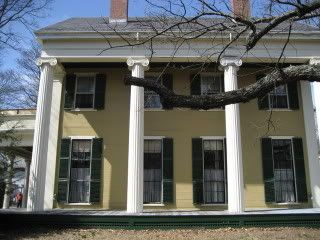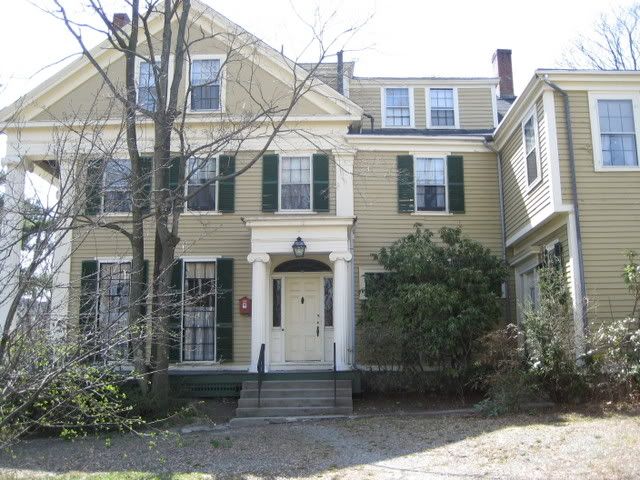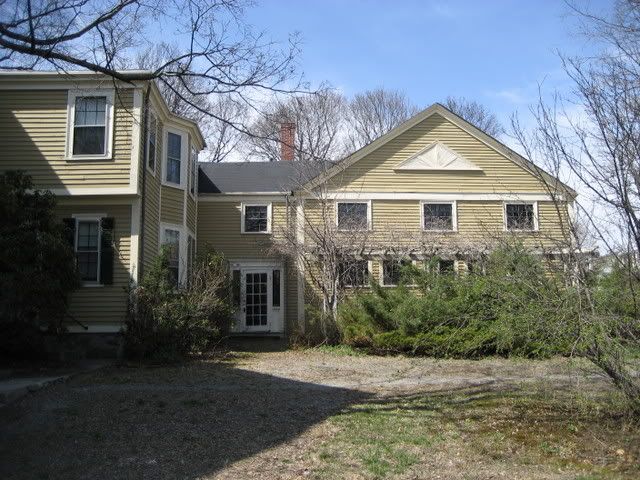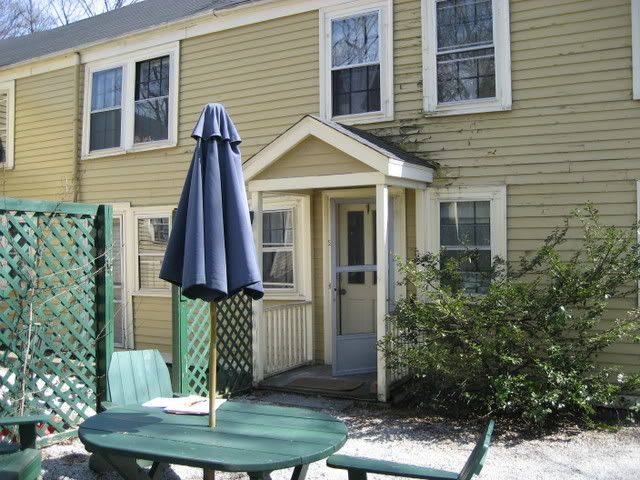(no subject)
so we are moving to west newton! i got the final word yesterday and we will be moving in to our new apartment memorial day weekend. our apartment is off the back of the historic Allen House, a former school and once a part of the underground railroad! i am very very very excited. the rent is cheap ($950 including heat & hotwater AND two parking spots!) and we get a little yard space, too! we are getting a BBQ asap!
i have so many plans, so many.... composting, a clothesline, an herb garden...
i am excited to cook bacon again! this may seem weird, but when you live in essentially one room, bacon is something you don't cook unless you want everything you own to reek for a week. but since we will have TWO FLOORS i don't have to worry about my pillow smelling like pork.
it's the little things, you know?
the front:

one side:

part of the same side (it's a big house!):

our entrance (clearly the house needs a paint job, but whatever, it's OLD.):

we only share one wall with one other tenant!! MIRACULOUS!
the pictures of inside didn't come out too hot, cause the other tenants still have all their stuff in it.
the lay out is basically an eat in kitchen and living room on the first floor, bedroom, bathroom and three closets on the second floor. everything is old and little wonky, like slanted doorframes and a really creepy old mirror in the bathroom. here is a picture of the kitchen:

this will be the first time since high school that i've had a dishwasher! i feel like i probably won't even use it.
and now, for the
Nathaniel came to Newton (1848) to be the director of the Model School, a part of Horace Mann's celebrated West Newton Normal School for Women, only a few years old and failing. The Normal School was the very first to educate women as teachers anywhere in the world. The Model School, made up of the children from Auburndale and West Newton (and a few paying day students from other villages), served as a proving ground for new teaching techniques and educational principles. When the Normal School outlived its West Newton campus is 1854 - due to, in no small part, the enormous success of Nathaniel's department (nearby school systems closed their schools one day a week to allow teachers to view Nathaniel's teaching methods and classrooms at work) - and moved to Framingham, Allen stayed on to continue this experimental school on a private basis. Under the name of "West Newton English and Classical School" (or "Allen School" as it came to be known), the school went on to make educational history for almost 50 years. Its principals, teachers and students (over 5000) came from over 40 foreign countries and every state in the Union. They were teachers of great import, having taught Cornell's first President, Henry David Thoreau, President of the NY Stock Exchange, Japan's crown prince, early Director of the Smithsonian, children of the Presidents of several South American countries (then thirsting for knowledge about the new methods for teaching in public schools), children of the Alcotts (an Alcott himself serving as a teacher for several years) and many many others.
While late-day historians somewhat neglected Allen until the recent rediscovery of his remarkable archives, all now in the possession of the corporation, subsequent study has shown that the Allen School contributed the following firsts, or contributed substantially to important conceprs to American education: Equal or joint education for boys & girls; inclusion of black students, from the very beginning (even during the torment and furor of the years of the Fugitive Slave Law, with no small risk to Nathaniel himself); earliest known gymnasium in a secondary school, including the erection of a bowling alley which exists today in the barn area!; argricultural training; the FIRST pure kindergarten in the US (1863); a broad curriculum with emphasis on natural sciences, goverment, political economy, training in involved mental arithmetic, astronomy, zoology, botany (with women students participant equally with the men), as well as practical training in art and music. Children kept journals (omitting formal study of English grammer per se) ; the first to require regular examinations as tests of work accomplished; no corporal punishment (Saturday mornings reserved for behavior and poor work problems - one receiving a written exercise appropriate to the crime, and the other receiving additional help as needed. Fifty years later, students wrote to Allen thanking him for this!)
The school stressed positive direction rather than negative regulations as a way to govern behavior; students (and parents) met regularly to discuss ways in which to better meet their needs - both to the teacher's and the student's. Allen enriched education by inviting speakers who where amongst the great of the period in every field: Emerson, Garrison, Parker, Sumner, Beechers, F.L. Douglas, Booker t. Washington. Children of the souther black families who were leaders in the Reconstruction came with their famous parents (Pinchback, Smalls, Antoine) and there some evidence now that our own historic black community in West Newton may have developed from this affiliation of Nathaniel's.
Although a private school, the Allens brought in as many needy students as they could afford to include. Scholarships were an important ingredient to the life of the school. The Day Book in our collection attests to this in the annual report of the Presidents. This book covers a span of over 40 years (1853-1893) - a remarkable journal of successes, failures, trials and tribulations of a special 19th century man.
The importance of the Allen House history is not confined for education. Allen was very much involved in other aspects of social reform, most notably an abolitionism and women's suffrage. As an abolitionist, he served as an officer of the Society of Garrison Abolitionists, and President of the West Newton Anti-Slavery Society. Both groups met in the Allen House, and the premises were an active link in the Underground Railroad (His parents before him, as early as 1840, had entertained (or given refuge to) Frederick Lloyd Douglas, who fifty years later wrote to Nathaniel remembering fondly the family's love and affection during his early years. This letter is now a part of our collection and being publshed as a part of a volume of his letters by Yale University.)
He and his wife and daughters spent a lifetime deeply involved in the equal rights of women, Allen having served as the first President fo the West Newton Women's Suffrage Association and his sister (also a teacher in the school) serving as on the first women elected to the Newton School Committee (c.1883).
i am so siked to eat at cabots and walking around the downtown, exploring with my polaroid. YAY!